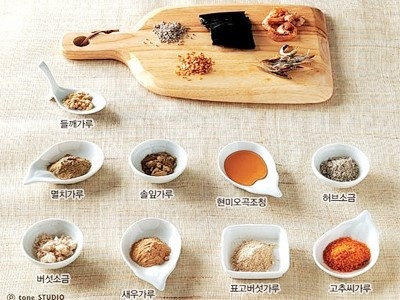There is a misconception that Korean food uses a lot of msg. Some Korean restaurants do use msg, but it is not a necessary ingredient of Korean cuisine. Traditional Korean food does not use artificial msg. Natural msg can be found in anchovies, mushrooms, and seaweed, etc. The enticing flavor that is the cornerstone of Korean cuisine (Han Bok-Ryeoh, Korea's foremost expert on royal Korean cuisine) can be created through the use of the foods mentioned above as well as meat, seafood, beans, and/or vegetables.
In Korean, monosodium glutamate (msg) is called:
조미료 (jo-mi-ryo, also means 'seasoning' in general),
글루타민산느트륨 (gloo-tah-min-sahn-nah-teu-ryoom),
글루타민산소다 (gloo-tah-min-sahn-soh-da)
or less commonly, 글루타민산모노나트륨 (gloo-tah-min-sahn-moh-noh-nah-teu-ryoom).
Artificial msg is known as 화학 조미료 (hwah-hahk jo-mi-ryo, 'chemical msg')
or 인공 조미료 (iin-gong jo-mi-ryo, 'synthetic msg').
Natural msg is known as 천연 조미료 (cheon-yeon jo-mi-ryo).
Natural Msg or 천연 조미료 via 행복지킴이
Nowadays, some Korean households and restaurants use msg as a convenience item, but due to the greater awareness of its ill effects on one's health, many use natural msg as it is healthful. Common ingredients in natural msg are mushrooms, anchovies, dashima (kelp), beef extract, etc. The ingredients are generally dried, roasted, and then powderized. I recommend not using msg when cooking Korean food because it cannot give the fresh and full flavor that can be obtained by using fresh and wholesome ingredients.
Posted by tastingkorea

No comments:
Post a Comment
Please do not spam the comments section with links unrelated to the post. If you have an informative link that is directly relevant to the topic, you may add it to your comment.